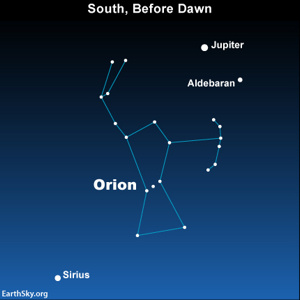
The 2012 Orionid meteor shower will peak this weekend! Look for the greatest numbers of meteors to streak the sky in the dark hours before dawn on Saturday, October 20, and Sunday, October 21, with forecasters giving the nod to Sunday.
You’ll need a cloud-free sky, away from city lights.
Fortunately, the waxing crescent moon will set way before the prime time hours for watching the Orionids. The chart at the top of this post shows the radiant point for the meteor shower, which is in the constellation Orion the Hunter.

From
the Northern Hemisphere, look for Orion, Sirius and Jupiter in the
south before dawn. From the Southern Hemisphere, look closer to
overhead.
Do you need to know Orion to see the meteors? Nah. The meteors will appear in all parts of the sky. But if you trace the paths of the meteors backwards, you’ll see they all seem to come from single point within Orion. The radiant point for the Orionids is above and outside Orion’s rectangle. But – again – you don’t need to identify exactly where the radiant is to enjoy the meteors, or Orion! Just go to a dark sky and look up.

Venus rises in the east about three hours before sunrise at mid-northern latitudes
What planets are visible in the sky after midnight now? The planet Jupiter beams to the northeast of Orion in October 2012. Also, in the hours before dawn, the dazzling planet Venus comes into view in the eastern sky. How can you identify Jupiter and Venus? By their brightness! They are brighter than Sirius, the sky’s brightest star. Venus is brighter than Jupiter.
Where do the Orionid meteors come from? Earth crosses the orbit of the famous Comet Halley every year in October. The meteors are debris from this comet that enter Earth’s atmosphere and vaporize as they fall.
How many meteors can you expect to see? The number will vary greatly depending on when and where you watch. Meteor showers are not entirely predictable. That’s the fun of them! At most, you might see about 25 meteors per hour, or one meteor every few minutes. But even one bright meteor can be memorable. Have fun.
Bottom line: The 2012 Orionid meteor shower will peak this weekend, with forecasters giving the nod to Sunday, October 21, in the hours between midnight and dawn. If you’re in Asia, you might lean more toward the morning of October 22. But October 20 might be good, too.
You’ll need a cloud-free sky, away from city lights.
info by: earthsky.org